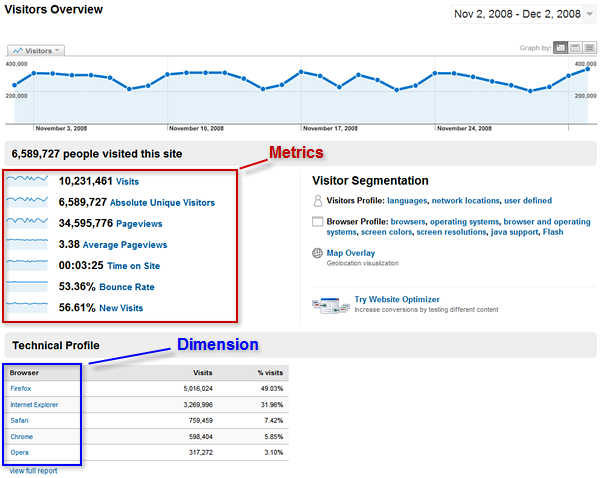Have you wondered how many times a single visitor has viewed
your page? Maybe you’ve had 100 visits today – was your website viewed by 100
different people? 75 different people? Maybe only one person viewed your site
100 times. While I hope it isn’t the latter, let’s take a look at how one
metric measures up in web analytics: pageviews.
According to the Web Analysis Association, page views is
defined as the number of times a page was viewed (Web Analysis Association,
2006). Digging a little deeper, this means you can define the type of file, module,
PDF, and others as a page and when a user views each, they can be counted as pageviews”
Here’s an example using Google as our model.
You can see Google has 34,595,776 pageviews. If you were
to visit Google’s homepage and its ‘about’ page today, that would count as one
visit and two pageviews.
According to Sports Marketing LLC, “generally speaking,
you want each visitor to look at as many pages on your site as possible.
Depending on the type of website you have, the type of advertising you do, and
the type of visitor you have, the average number of pageviews per visitor can
range from [a low number] to as many as 40 pages per visit for a site like
Craigslist. Google has a benchmarking service that allows you to compare your
site to similar sites by industry” (Sports Marketing LLC, 2009).
Though tracking page views is an analytics tool some
businesses will find helpful, pageviews can fall short as they do not measure
how engaged the users that view your website actually are. There are many
variables at play when measuring engagement, and there are many ways to define
and track it. Taking pageviews at face value can mislead marketers relying on
the metric to analyze their data. The question to ask is: did the visitors view
different pages within the website because they were interested in the content
on each page or were they browsing the site because they could not find what
they were looking for?
It can be difficult to determine how beneficial pageviews
can be to a business. “Pageviews are often taken to advertisers as proof of a
campaign's performance but pageviews offer no insight into the quality of
content, or the impact it may have had on a reader” (Reid, 2014). However,
there are benefits to using pageviews as a metric.
Doubling
Your Pageviews
What if you wanted to attract more viewers to your
personal or business blog? How can you do this? Utilizing the more tag sparks
curiosity and grasps the viewers’ attention, thus increasing your change of gaining
more pageviews. A post on Blogussion.com states:
[There] is a very exciting benefit to the more tag. Say
for instance someone found your blog through Google and was sitting on your
homepage reading the excerpt to your latest post. That’s one view. They are
interested, and they visit the next page to read the full post. There’s one
more. So by using the more tag, you will likely get two pageviews per person
when they visit your blog and get interested. Add that up over time when more
people do it, and you can get thousands of hits with less people (Blogussion,
n.d.).
All in all, pageviews have its pros and cons – ultimately
it depends on you whether or not it is a good metric for you to utilize in gaining
and understanding the analytic data of your website.
Batra, A. (2009, June 18). Hits, page views, visitors,
and visits demystified. Retrieved from http://webanalysis.blogspot.com/2009/06/hits-page-views-visitors-and-visits.html#axzz3I3iMDKed
Blogussion. (n.d.). Double your page views – pros and
cons of displaying partial posts. Retrieved 2014, November 3 from http://www.blogussion.com/favorites/increase-pageviews-partial-posts/
Reid, A. (2014, May 3). What are the alternatives to
pageviews? Retrieved from http://www.journalism.co.uk/news/measuring-the-news-what-are-the-alternatives-to-pageviews-/s2/a556640/
Sports Marketing LLC. (2009, September 29). What are
visits, visitors, and page views? google analytics for beginners. Retrieved
from http://sporkmarketing.com/376/what-are-visitors-unique-visitors-and-page-views-google-analytics/
Web Analysis Association. (2006). Web analytics the big thee definitions. Retrieved from http://www.digitalanalyticsassociation.org/Files/PDF_standards/WebAnalyticsDefinitionsBig3.pdf


No comments:
Post a Comment